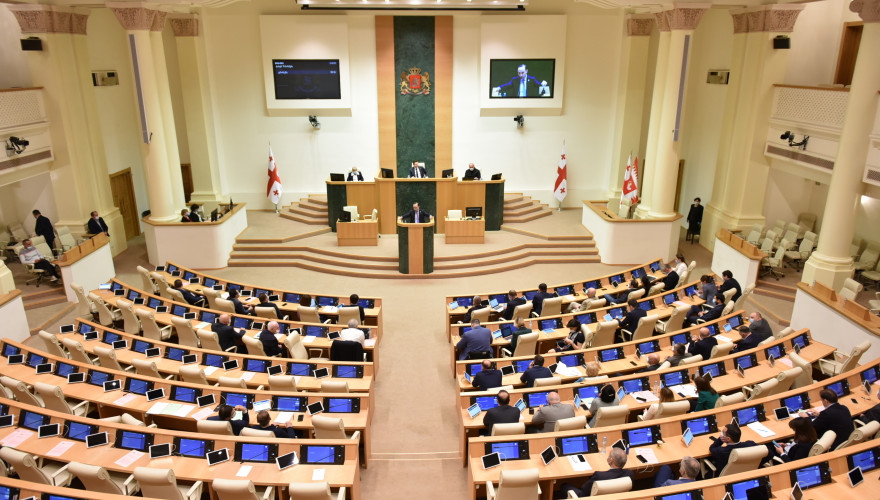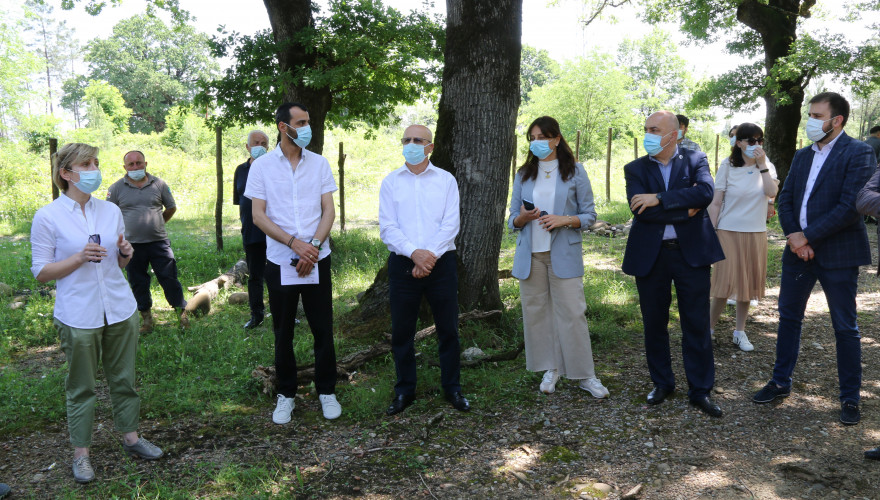Plenary Session of the Parliament

The Plenary Session commenced with deliberation of the Bill on Code of Administrative Offenses.
According to Anri Okhanashvili, Chairman of the Legal Issues Committee, the draft law aims to bring Article 247 of the Code of Administrative Offenses in line with the Constitution of Georgia - "We share Mr. Levan Ioseliani's proposal, which was related to 24 + 24 hours. Let's set another precedent for cooperation and sharing ideas between the ruling party and the parliamentary opposition. So, I agree to share L. Ioseliani's remark regarding 48 hours, instead of 24”.
The bill stipulates that an individual during an administrative detention shall be brought before the court at the earliest opportunity, but not later than 24 hours.
"In order to obtain evidence, this period may be extended by no more than 24 hours. In this case, the relevant employee of the authorized body shall justify in writing the expediency of the extended period. It was what Mr. Levan proposed”, - A. Okhanashvili remarked.
MPs express their views regarding the bill.
"This is a political issue and not a matter of articles and paragraphs. The only justification in the explanatory note is that it turns out that protests have increased in recent years and are taking the form of violations, and therefore fines should be increased. Don’t you think that the protest is increasing in the society, because the government of the "Georgian Dream" has degraded the reforms of economy, justice, social policy and many other and these people are protesting the outcome of your actions? Do you really believe that articles will stop the public protest that arises on very legitimate grounds? Do you really believe that? This is a code passed in 1984, in which you are trying to make changes again, which suppresses the right to protest. You cannot intimidate people with either increased fines or imprisonment”, - the representative of the opposition, Ana Natsvlishvili stated.
In response to his colleague’s remark, A. Okhanashvili stated - "Thank you for the criticism, for the remark. This is what the Parliament and the society need”.
He also responded to opposition MP Anna Buchukuri - "During the work of your team in the Ministry of Internal Affairs, the administrative responsibility has been tightened in a number of areas”.
According to Alexander Elisashvili, initiating this bill "is an irritating idea, pouring fuel on the fire that is barely extinguished" . According to him, the introduction of this idea is against the agreement reached between the parties - "It turns out that our colleagues who didn’t attend yesterday’s Ministerial Hour are not interested in the virus. You seem to be satisfied with the Ministry of Health. Why are you in opposition then? Why didn't you come? Why did Levan have to fight alone to change 48 hours to 24?! Here we are talking about responsibility and irresponsibility, the sense of fate of the people, and the love of the country. During the Minister’s visit, you were gathered thinking about who will support whom in the mayoral election”.
According to Mikheil Sarjveladze, Chairman of the Human Rights and Civil Integration Committee, the situation with regards to the bill looks like a storm in a glass - "There were many lies in the critical statements. In fact, 48 hours was a capping mechanism. However, we must say what did not exist before, the initiative says "at the earliest opportunity." This is the essence of the initiative and in this regard the legislative order is being improved, it is in full compatibility with the standard guaranteed by the Constitution”.
The representative of the Majority, Rati Ionatamishvili, thinks that incompetence appeared during the criticism of the bill leads to a curious situation, because amid the discussion of one document, Ana Natsvlishvili was talking about a completely different law - "Article 247 of the draft law does not envisage sanctions at all. Ms. Anna even talked to us about sanctions. It is very awkward for such curiosities to be allowed in the Georgian parliament and more training is needed”.
Other amendments to the Code of Administrative Offenses were also discussed today.
According to A. Okhanashvili, Article 166 of the Code is supplemented with Part II, which stipulates that the repeated commission of the same administrative offense by a person charged with petty hooliganism will result in a fine of 1500 to 2,000 GEL or a detainment from 7 to 15 days.
"This part was also remarked regarding the minimal term of the detention. We propose to amend II part to envisage a fine in the amount of 1500 to 2000 GEL or the administrative detention from 5 to 15 days. As for Article 173, we suggest not to change the amount of the fine in case of repeated commission, while as for detention, we could reduce it to 7 to 15 days”, - A. Okhanashvili stated.
According to MP David Zilfimiani, the definition of petty hooliganism in the 80s was different and all the actions of different severity, which are considered petty hooliganism today, could not be responded equally - "It is necessary to define the meaning of petty hooliganism precisely”.
According to Levan Ioseliani - "Increasing fines is not the right decision. Therefore, this option will not be upheld by us”.
As A. Okhanashvili remarked, the dignity of the Georgian Dream is that it respects the opinion of its opponents - "Part of our election program is our responsibility for reforming the Code of Administrative Offenses. Of course, Georgian Dream will be the team that will be able to successfully implement this reform and we will all have the opportunity to be involved in this process”.
MPs deliberated and endorsed the aforementioned bills with III reading and in an accelerated manner.
MPs elected Archil Talakvadze as the Vice-Speaker of the Parliament with 86 votes.
During the Plenary break, the Bureau convened a sitting.
After the break, MPs heard the report on the activities of the State Security Service for 2020.
Prior to the report, the Speaker thanked the Defense Forces for their service to the country - "Today is 30 years since the establishment of the Georgian Defense Forces. I would like to thank our heroes for their dedication and truly worthy service to the homeland”.
The report was introduced by the Head of the Service Grigol Liluashvili - "Our government pays a lot of attention to the environment in which the country is developing. The service is paid special attention by the relevant Committee. On April 26, the Committee, together with other two committees, deliberated the report. I hope my First Deputy answered all the questions thoroughly. Within the framework of the Parliament of X convocation, the representatives of our service have met several times, both in the format of a committee and in the format of a trust group. I was also represented in the trust group, where I hope that I have comprehensively presented all the information, including the covert information, which was of interest to the members of the group”.
According to the rapporteur, the first chapter of the report is devoted to the occupation, just like in the previous reports - "I will confirm once again that the number one challenge for the country is the Russian occupation. The situation has not fundamentally changed in any area where the Georgian government is temporarily unable to exercise effective control. Three main points identified by the Russian Federation as part of the occupation are Russian annexation and the control of as many territories as possible. It is also important to note that the unfavorable socio-economic situation in the occupied territories under the annexation allows the Russian side to effectively control the existing de facto governments and make the desired decisions. The second point is the process of hybrid warfare, which involves illegal border-making, illegal detentions, and all incidents that occur both near the conditional demarcation line and in the depths of the occupied territories. This is an attempt by the Russian side to exclude the negotiation process as a party in order to avoid responsibility. It has become very popular recently that we should have a direct dialogue with our Abkhaz and Ossetian brothers. Of course, this is unconditional - we must talk to them, however, we must be very careful not to stick to each other in the negotiations but make sure that the responsibility falls on the force that actually exercises effective control over these territories today”.
G. Liluashvili expanded on the Russian military units, illegal military exercises, which increase the risks in the Caucasus - "Last year, the State Security Service reported 64 cases of illegal detentions in occupied Tskhinvali, but this does not reflect the actual number, as illegal detentions continue deep into the occupied territories, where access to information is more difficult”.
According to him, the illegal detention of our two fellow citizens Zaza Gakheladze and Irakli Berua, who were illegally detained, remains a particularly acute issue - "By 2020, the idea of a direct dialogue with Abkhazians has become widespread in the territory controlled by the central government. I want you to consider the risks that may accompany this process when discussing this issue. Consequently, there was always an imitation through a disinformation machine that the Georgian government seemed to be avoiding a bilateral dialogue. It was well used by the forces owning the hybrid machine, specifically the Russian occupation forces, to discredit the format of the ongoing talks in Geneva, where we are talking to our international partners about common problems related to the occupation”.
According to the rapporteur, in order to protect the state from the intelligence activities of certain countries and possible destructive actions, the State Security Service of Georgia has taken significant steps.
The Counterintelligence Department of the Service has launched an investigation into 12 criminal cases. Of these, 16 criminal cases were filed in court against 16 persons.
A guilty verdict has been handed down against 7 persons, while the trial of 9 persons is still ongoing.
During the reporting period, the State Security Department of the Service was investigating 5 criminal cases.
The speaker dwelt on cases of dissemination of disinformation.
As the report elucidates, Georgia is still among the very low-risk countries in terms of the impact of terrorism. According to the document, during the reporting period, the State Security Service continued to work actively in the fight against terrorism, which included, among other things, the detection of international terrorist threats, preventive activities, improving mechanisms to combat terrorism.
The rapporteur spoke about the steps taken in the fight against corruption, focusing on the personnel policy of the service.
After the end of G. Liluashvili's speech, the session resumed in a camera.





